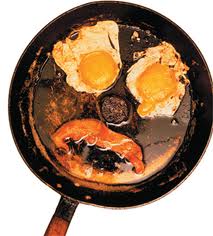
It should come as no surprise that greasy and fried foods affect our health in many negative ways.
Weight gain can lead to obesity, which can lead to high blood pressure, heart problems, diabetes, and even death.
In excess, this can lead to serious problems, especially because cholesterol buildup can block the blood flow in the arteries, leading to heart failure or causing a stroke, the number one cause of death in America. 
The type of fats we consume affect our cholesterol levels. According to the Harvard School of Public Health, trans fats are considered bad fats because they lower the HDL cholesterol and raise the LDL cholesterol.
Hydrogenated fryer oil is made by combining vegetable oil with hydrogen gas. This process extends the life of the oil and allows it to be heated repeatedly without breaking down.
We consume some of the trans fats from the hydrogenated oil the fried food is cooked in.
On average, Americans eat about 6g of trans fats per day. We should be consuming less than 2g a day to avoid negative effects on our cholesterol.
Food usually becomes greasy because it has been deep fried in hot oil. This oil has a high fat, high-calorie count.
Even something nutritious, such as fish, loses that advantage when it is deep fried and greasy.
Having fat in your diet is important for metabolizing certain vitamins, providing energy and for growth.
Some fats are better for your body than others. Fried foods are full of unhealthy fats that can increase your cholesterol.
Having high cholesterol can lead to atherosclerosis, high blood pressure and heart disease. Limit or exclude fried foods from your diet to avoid having unhealthy cholesterol levels.
Low-density lipoprotein, or LDL, cholesterol is the "bad" cholesterol that causes numerous health problems that lead up to heart disease.
According to the Mayo Clinic, if you have heart disease or a family history of heart disease, your LDL cholesterol should be below 70 mg/dL.
Healthy adults should aim for LDL cholesterol below 100 mg/dL. A diet high in fried foods will more than likely increase your LDL cholesterol.
High-density lipoprotein, or HDL, cholesterol is the "good" cholesterol in your body. HDL cholesterol travels through your body and picks up the excess LDL cholesterol.
It then takes the LDL cholesterol to the liver, where it is broken down and discarded. Aim for HDL cholesterol levels above 60 mg/dL. Eating too much fried food may lower your HDL cholesterol.
Besides the obvious high calorie, fat and cholesterol effects of fried foods, there are nearly no nutritional values found in friend foods.
There really isn’t much room for anything healthy when the bulk of a meal is greasy or fried.
In fact, the more greasy food you tend to eat, the less healthy food you will tend to eat. This means your body is not getting the vitamins it needs to thrive and grow.
Without these vitamins, you skin could become pallid, you could lose muscle mass, and you could become anemic. In addition, deep frying healthy foods in fatty oil can cancel out their health benefits entirely.
The poor overworked liver has to work extra overtime to clean out all of the fat and process the fried foods that is consumed, especially if the liver has to process the sugars and the alcohols that is being processed in the body as well.
Therefore, the fat in the greasy foods will build up in your liver and gall bladder, and you will get gallstones, which are very tiny but extremely painful.
Greasy, fatty foods also do not digest well. This can lead to problems such as excess gas, bloating, irritable bowel syndrome (IBS), stomach pain, diarrhea, constipation, and even more serious problems such as colon cancer.
Remember that anyone who consumes greasy fried foods including deep-fried or breaded foods, which are high in fat on a regular basis, puts themselves at a greater risk for high blood cholesterol and heart disease.
Diets high in saturated fat and cholesterol tend to raise total cholesterol and LDL cholesterol.
Foods that are fried or breaded tend to be very high in fat because they are cooked in fat. When you fry foods, such as chicken, that already contain saturated fat, you simply add more fat to them.
Get tested for your blood cholesterol levels and know where you stand.
Remember to count those used in cooking. Choose fats and oils that are mostly unsaturated, such as olive oil. Avoid or limit those that are highly saturated, such as lard or butter.

Rather than deep-fry or pan-fry, cook your food by steaming, baking, broiling, roasting, grilling, or stir-frying.
If you love fried foods but do not want to consume the unhealthy trans fats, you can make some adjustments in the recipes.
Make a quick crust by crushing crispy rice cereal in a food processor.
Add your favorite herbs, salt and pepper. Select your favorite protein, such as chicken strips, shrimp or fish, dip the meat in flour, bread crumbs or cereal mixture and, eggs.
Repeat this process two times. Seal in flavor by searing it in a hot skillet and then finish cooking it in the oven.
In the end, you will have a delicious crispy food that has not been fried. You can also make fries crispy by baking them on a hot cookie sheet with olive or coconut oil.
These simple tricks will allow you to feel like you are eating fried foods, but you will not be consuming all of the bad trans fats.
Cooked using one of these healthier methods helps to improve cholesterol levels and the health of the heart.
Resources: CBS, NaturalNews.com, HealthGuidance.Org, Shape.com, MedPageToday.com, BBC.co.uk, News-Medical.net
